Pembroke Campus History
Algonquin College’s Pembroke Campus was founded with the Ontario College system in 1967, but the seeds for a campus were sewn in 1965 when a newly formed Educational committee of the Pembroke Chamber of Commerce submitted a 15-page report to the Ontario Ministry of Education. The document was entitled, “Submission for Establishing a College of Applied Arts and Technology in Pembroke,” and was forwarded to the Conservative Government of John Robarts, at a time when the province was booming and investing significantly in its infrastructure, including schools.
Premier Robarts had enlisted William Davis, a future premier and Education Minister at the time, to build a new college training network within the province, replacing vocational schools, with institutes of higher learning that would be community focused. By 1968, there were 18 colleges operating in Ontario.
Pembroke Mayor William Kutschke saw the potential for having a college in what was then the Town of Pembroke and began engaging some local businessmen and educators about putting forward a proposal. William Thompson, a high school principal, chaired the Educational Committee that first proposed that Pembroke be granted its own college. However, the government instead awarded a college to the city of Ottawa, which then announced its plans to establish satellite campuses in several locations including Pembroke.
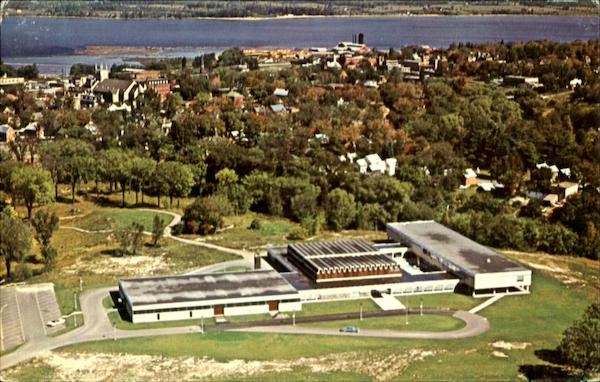
An Aerial View Of Champlain Secondary School
In October of 1967, the Pembroke Campus welcomed its first sixteen students, primarily in evening courses that were taught at the former Champlain High School. Full-time programs began in September of 1968 with 49 students registered in programs that included Business Administration, General Technology and Architectural Drawing.
Arthur Tiesdell was named the first Principal of the Pembroke Campus, a position he retained until 1974 when he was replaced by Frank Havey. Havey would become the longest serving Principal at the campus. Donald F. Runge was chosen as the First Board of Governor to represent the campus.
As the campus started to get on its feet the search began for a permanent location. A new home was found at the former Maple Leaf Dairy on Pembroke Street, the same location that the college would occupy until its new waterfront campus opened in 2012. At the time, the Dairy building was already about 60 years old, but a brand new section was added on to accommodate more classrooms as the college prepared for expanded enrolments.
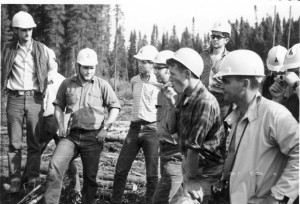 In the early years, the College offered outreach programming to several communities in Renfrew County, in what was known as the “Manpower Training Program.” The Forestry program, which continues to be a flagship program at the Pembroke Campus, was first offered in 1969. At one point it was delivered in both English and French during the years when Algonquin was a bilingual college in the 1970s and ’80s.
In the early years, the College offered outreach programming to several communities in Renfrew County, in what was known as the “Manpower Training Program.” The Forestry program, which continues to be a flagship program at the Pembroke Campus, was first offered in 1969. At one point it was delivered in both English and French during the years when Algonquin was a bilingual college in the 1970s and ’80s.
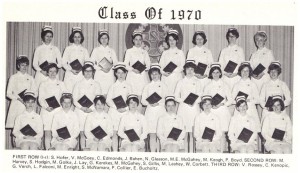 In May of 1971, the first two-year diploma graduates received their credential at the Pembroke Convocation ceremonies. In 1976, the campus took over Nursing education from the Lorrain School of Nursing operated by the Grey Sisters of the Immaculate Conception. The Grey Nuns had been teaching nursing in Pembroke since 1916, but the Ontario government announced in 1973 that all nursing programs would be transferred to colleges and universities.
In May of 1971, the first two-year diploma graduates received their credential at the Pembroke Convocation ceremonies. In 1976, the campus took over Nursing education from the Lorrain School of Nursing operated by the Grey Sisters of the Immaculate Conception. The Grey Nuns had been teaching nursing in Pembroke since 1916, but the Ontario government announced in 1973 that all nursing programs would be transferred to colleges and universities.
In the fall of 2000, the Pembroke Campus launched its popular Outdoor Adventure program. This program proved to be a catalyst for significant enrolment growth at the campus, as it attracted the majority of its students from outside of Renfrew County. Additional unique programs such as Commercial Pilot and Aviation Management, Outdoor Adventure Naturalist, and Radiation Safety would follow, allowing the campus to continue with its ambitious enrolment expansion.
In 2004, the campus launched its first degree program when it partnered with the University of Ottawa to offer the four-year collaborative Bachelor of Science in Nursing program. The move was necessary when the province announced that all new nursing graduates were required to have a minimum of a Bachelor’s Degree to practice.
In the early 2000s, there was a renewed interest in building a new campus. There were many meetings with Ontario government officials, including a well-publicized plan that would have seen the campus switch buildings with the Ministry of Natural Resources. At the time, the city’s ageing provincial jail was being closed and the plan called for the college building to house a mini-jail, court facilities and the MNR offices. The College would have needed to renovate the MNR building to convert it into a campus. Eventually, the plan fizzled away, but it planted a seed for further considerations for either a significant renovation to the existing campus or a new building.
In 2006, the campus commissioned an economic and socio-economic study that demonstrated the campus generated more than $150-million in annual economic activity in Renfrew County. This report became a key advocacy tool as the campus leadership and broader community lobbied for a new campus. There would be additional studies that included a fundraising feasibility study to determine whether the community would support a capital funding campaign.
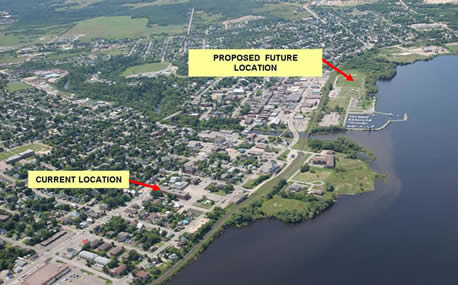 After waterfront land was secured from the city of Pembroke for a minimal fee and the Algonquin College Students’ Association committed to investing $4-million into a new Pembroke Campus to ensure students had fitness and recreational facilities, the College Board of Governors voted unanimously on November 10, 2008 to authorize the building of a Waterfront Campus, with or without government funding, to be opened no later than 2012.
After waterfront land was secured from the city of Pembroke for a minimal fee and the Algonquin College Students’ Association committed to investing $4-million into a new Pembroke Campus to ensure students had fitness and recreational facilities, the College Board of Governors voted unanimously on November 10, 2008 to authorize the building of a Waterfront Campus, with or without government funding, to be opened no later than 2012.
The new “Renaissance Square” Waterfront campus opened on October 28, 2012. The project was valued at $36-million. No provincial funding was secured, however, a $3-million grant through the federal government’s Enabling Accessibility Fund was part of the financing of the new campus, as was a $2.5-million community fundraising campaign.
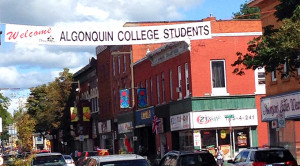 By the Fall of 2017, the campus was experiencing record enrolments of more than 1,000 full-time students, offering 20 full-time programs. The enrolment growth sparked economic renewal in Pembroke’s downtown core. Three privately owned and operated student residences had opened to support the more than 50 per cent of students who had relocated to Pembroke to study at the campus.
By the Fall of 2017, the campus was experiencing record enrolments of more than 1,000 full-time students, offering 20 full-time programs. The enrolment growth sparked economic renewal in Pembroke’s downtown core. Three privately owned and operated student residences had opened to support the more than 50 per cent of students who had relocated to Pembroke to study at the campus.
In 2017, the campus celebrated its 50th anniversary and launched three new full-time programs: Urban Forestry-Arboriculture; Applied Nuclear Science and Radiation Safety; and Action Sports and Park Development.
In 2018, more than 20 international students enrolled at the campus. The students enrolled in a variety of programs, coming to Pembroke from countries such as India, Vietnam, the United States, Morocco, Africa, Ukraine and Panama. As the campus became more culturally diverse, clubs such as the African Student Alliance were formed and the campus also embraced the recommendations of the Truth and Reconciliation report, bringing more Indigenous learning opportunities to students and employees.
In March of 2020, the World Health Organization declared a pandemic as the COVID-19 virus spread across the planet. The pandemic required all colleges and universities in Canada to move to remote learning as campuses were closed to all but essential workers. Students completed their winter term by accessing classes through the video conferencing system (Zoom) that allowed for real time classes.

In the summer of 2020 the province of Ontario allowed some face to face instruction to resume where physical distancing could be respected to stop the spread of the deadly virus. The Forestry Technician program at the Pembroke Campus was among a handful of Algonquin College programs that were permitted to resume. Students returned to campus for the months of July and August, but all of their classes were offered outdoors as they learned practical Forestry skills to complete their program.
As the world emerged from the COVID-19 pandemic, much had changed. In the post-secondary system, international student enrolments grew exponentially and at the Pembroke Campus students from several countries arrived including India, Hong Kong, Mexico, the Philippines, Ukraine, China and Jamaica. New graduate certificate programs like Environmental Management and Assessment and an additional Winter intake of Practical Nursing were very attractive to international students. By the Winter of 2023, more than 100 international students were studying at the campus. Only a year earlier, only about 30 international students were enrolled at the Pembroke Campus.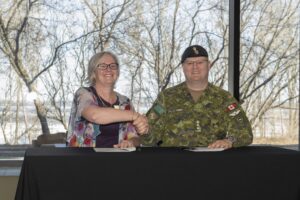
In the spring of 2023 the Pembroke Campus signed a Memorandum of Collaboration with Garrison Petawawa, an initiative to formalize the relationship that the college and military base have had for several years. The MOC was signed as the Canadian Armed Forces faces significant challenges in attracting troops and more soldiers leave the military earlier than expected.
Also in the spring of 2023, the Pembroke Campus dedicated a new Indigenous Medicine Wheel Garden. Located on the western tip of the campus property, the garden became a space for reflection, prayer and healing.
The Pembroke Campus has had seven Deans/Principals in its 50+ year history.
- Arthur Tiesdell (1967-1974)
- Frank Havey (1974-1990)
- Bob Wilson (1990-1999)
- Marguerite Donohue (1999-2006)
- Karen Davies (2006-2019)
- Dr. Keltie Jones (2019-2022)
- Sarah Hall (2022-2024)